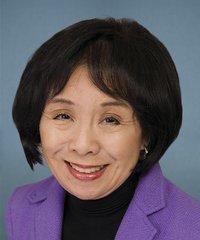
Congresswoman Doris Matsui has represented the city of Sacramento and its surrounding areas since 2005. As a senior member of the House Energy and Commerce Committee, she serves on the Health and Energy subcommittees and is the Vice Chair on the Communications and Technology subcommittee. She is committed to strengthening Sacramento’s flood protection, ensuring quality, affordable health care for all, promoting a clean energy economy, and creating a vibrant region where families can live, work, and play.
As Co-Chair of the High Tech Caucus and a member of the Energy & Commerce Communications & Technology Subcommittee, Congresswoman Matsui is working to address the pressing tech issues of today and tomorrow while increasing the accessibility and affordability of communications services.
Almost one third of Americans have not adopted broadband at home – and the cost of subscribing to service is most often the highest barrier preventing non-adopters from fully participating in our digital economy. As a result, these Americans are at a competitive disadvantage when it comes to employment, education, and other opportunities. The Congresswoman authored the first piece of federal legislation to address this problem by expanding the Lifeline program, a program that has helped low income Americans get telephone service since President Reagan’s Administration, to cover broadband access.
Congresswoman Matsui has also been a champion of net neutrality and ensuring our nation has a free and open Internet. She has authored legislation that would prohibit so-called Internet fast lanes from harming consumers, small businesses and innovators.
During her time in Congress, the Congresswoman has continuously advocated for policies that allow our wireless economy to grow. As Congresswoman Matsui likes to say, the airwaves, known as spectrum, are the invisible infrastructure of our mobile society. Congresswoman Matsui champions an all of the above approach to improve the efficiency of how we use this finite resource – everything from creating new opportunities for WiFi to improving the way the federal government uses spectrum. For example, the Federal Spectrum Incentive Act of 2015 will ensure consumers can make wireless connections on their smartphones, tablets, and devices now and into the future – and give federal agencies the opportunity to improve their missions. The legislation won unanimous approval from the House Energy & Commerce Communications and Technology Subcommittee in 2015.